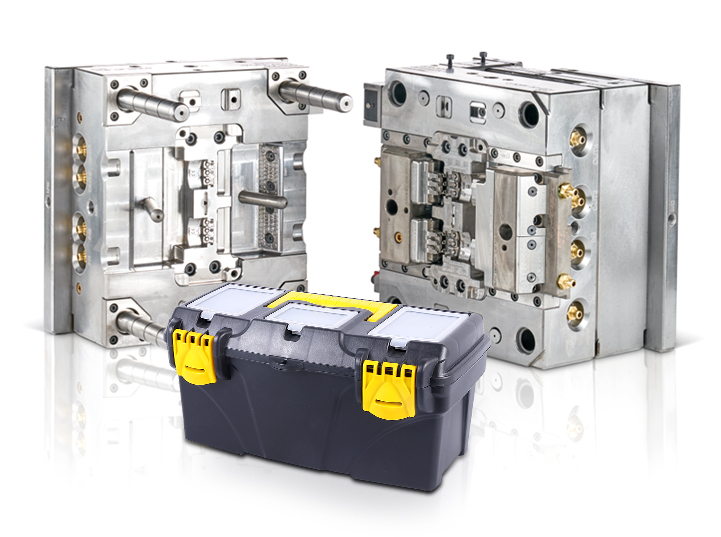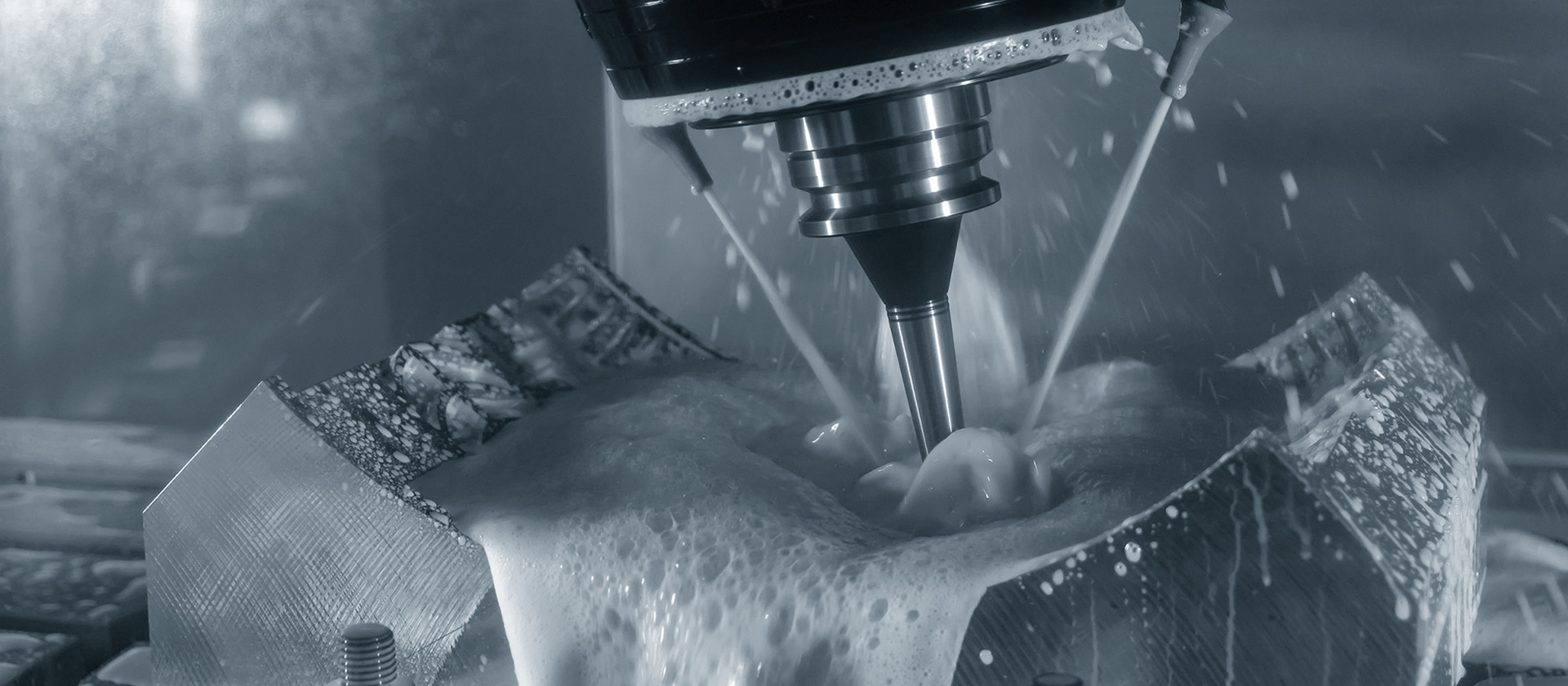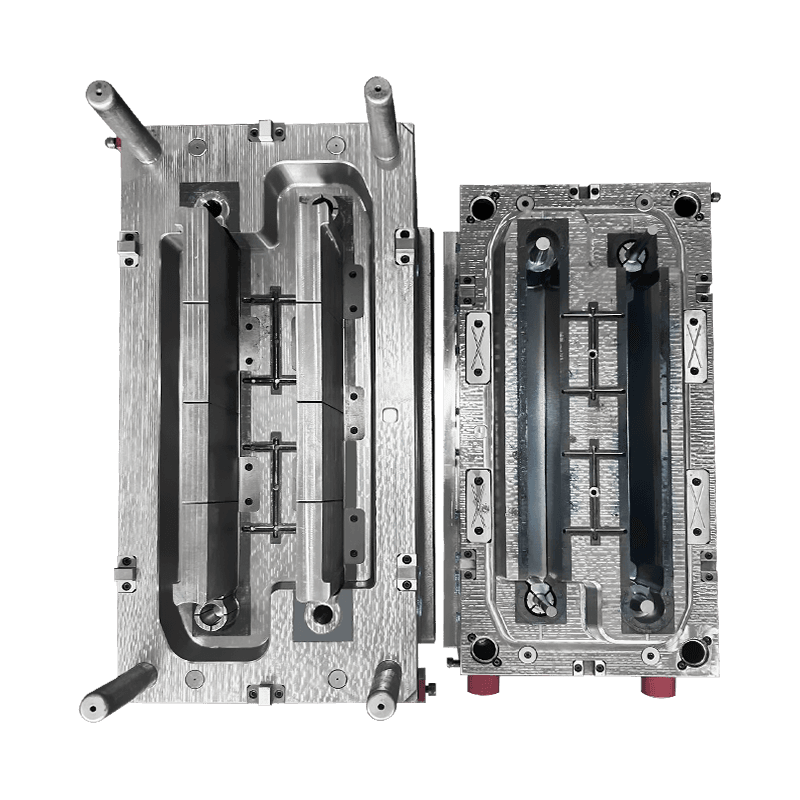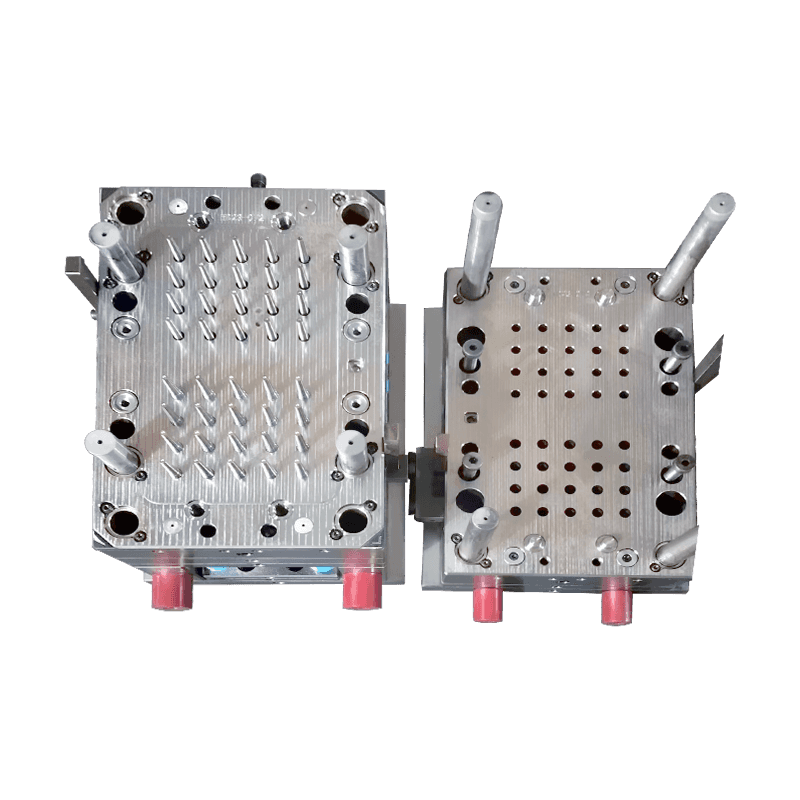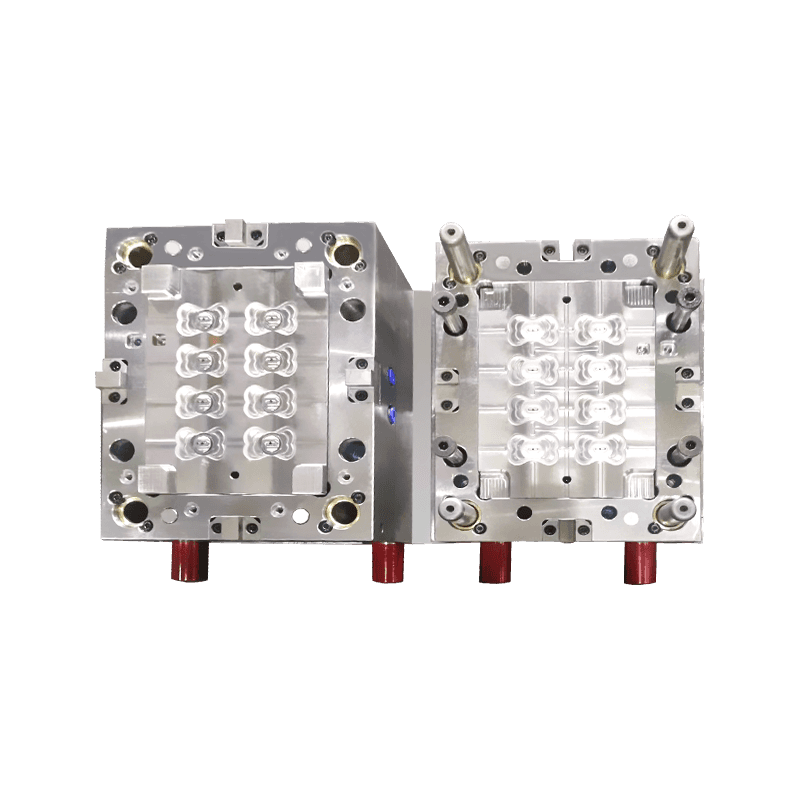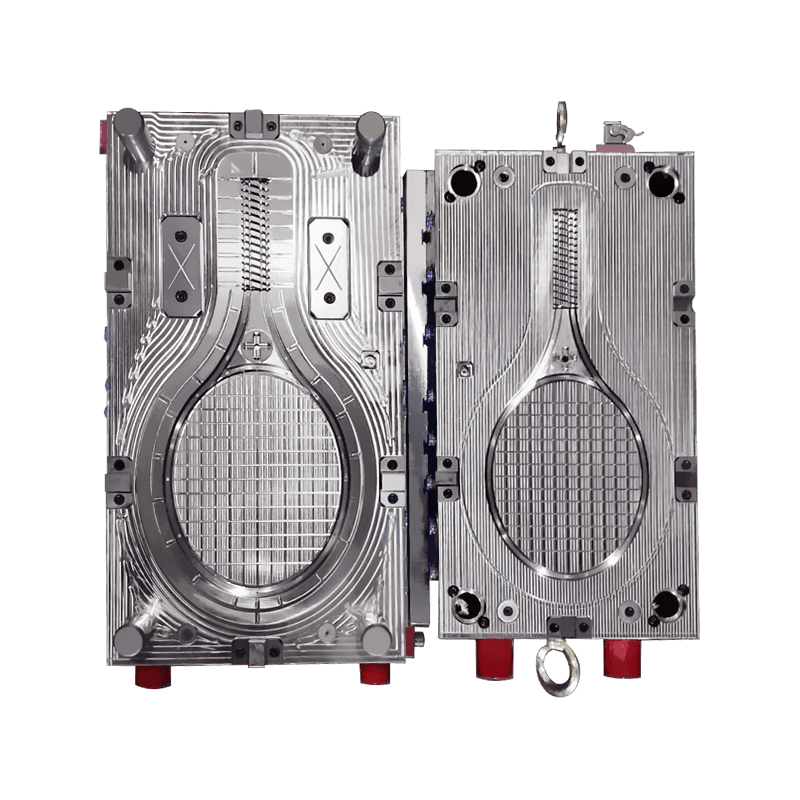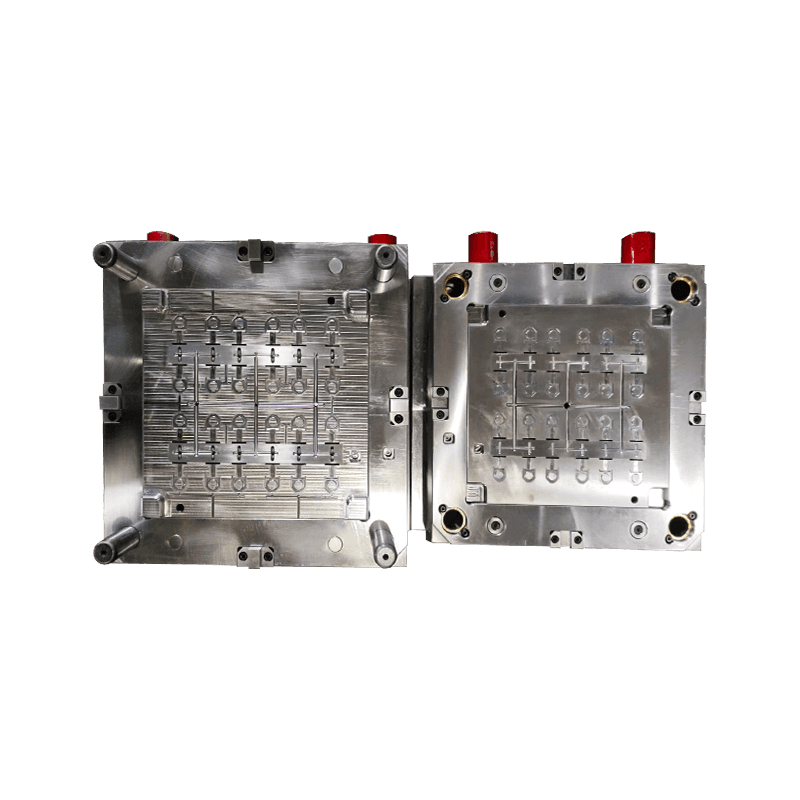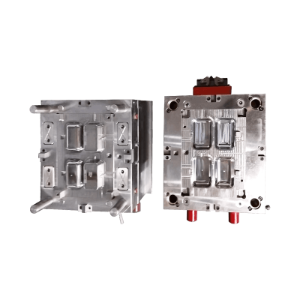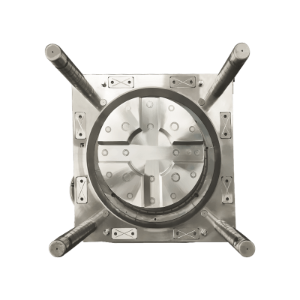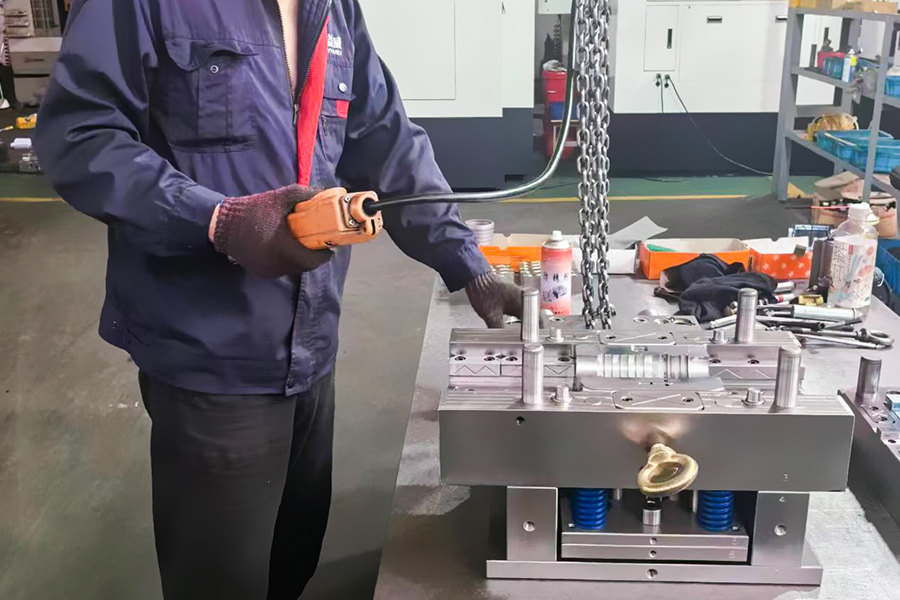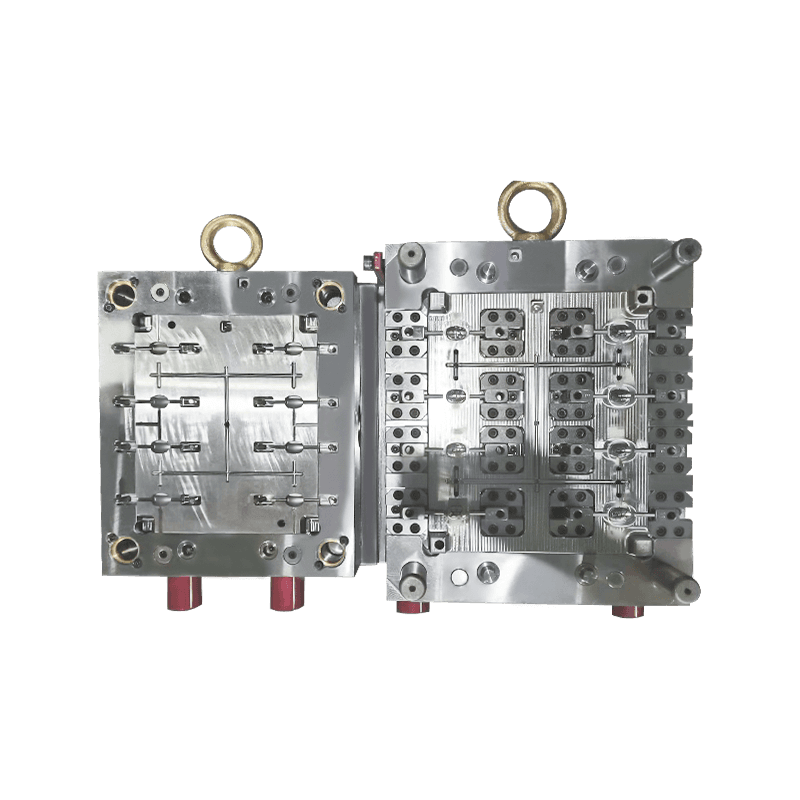We conduct strict quality control on the production process to ensure that product quality meets customer requirements.
-

Annual Output / Ton
0 -

Working Engineer
0+ -

Export city
0
-
Product Center Toolbox And Accessories MoldToolbox and accessory molds are common mold products in the manufacturing industry and are used to produce various types of tool boxes and accessories.
Toolboxes and accessories molds are essential components in the manufacturing industry, facilitating the production of various types of toolboxes and accessories. These molds are meticulously crafted to ensure precise replication of intricate designs and functional features required in toolboxes and their accompanying accessories.
Design and Engineering:
Designing and engineering toolboxes and accessories molds involve a comprehensive understanding of the intended product's specifications and requirements. Engineers meticulously design these molds using advanced CAD (Computer-Aided Design) software to ensure accuracy and efficiency in the manufacturing process. Factors such as material selection, Mold cavity design, and cooling systems are carefully considered to optimize mold performance and longevity.
Material Selection:
The choice of materials for toolboxes and accessories molds is critical to their performance and durability. High-quality materials such as tool steel or aluminum alloys are often preferred for their wear resistance, thermal conductivity, and machinability. The selection of the appropriate material depends on factors such as production volume, part complexity, and budget constraints.
Manufacturing Process:
Toolboxes and accessories molds are typically manufactured using precision machining techniques such as CNC (Computer Numerical Control) milling, turning, and EDM (Electrical Discharge Machining). These processes ensure the accurate and repeatable production of mold components with tight tolerances. Post-machining processes Such as polishing and surface treatment are employed to enhance the mold's surface finish and longevity.
Quality Control:
Quality control is paramount in the production of toolboxes and accessories molds to ensure consistency and reliability in the final products. Rigorous inspection protocols are implemented throughout the manufacturing process to verify dimensional accuracy, surface finish, and overall functionality. Advanced metrology tools such as CMMs ( Coordinate Measuring Machines) are utilized to conduct precise measurements and ensure adherence to design specifications.
Applications:
Toolboxes and accessories molds find applications across various industries, including automotive, aerospace, construction, and DIY (Do-It-Yourself) sectors. These molds enable the mass production of toolboxes, tool trays, organizers, and other accessories essential for storing and transporting tools efficiently. The versatility of these molds allows for the creation of customized solutions tailored to specific user requirements.
Toolboxes and accessories molds play a crucial role in the manufacturing of essential storage and organizational solutions for various industries. Through meticulous design, engineering, and manufacturing processes, these molds ensure the production of high-quality toolboxes and accessories that meet the demands of modern-day applications. Continuous innovation and advancement in mold technologies further enhance their efficiency and effectiveness in the production environment.
As a toolbox and accessory mold manufacturer, we provide comprehensive services, including mold design and engineering, material selection advice, precision machining and manufacturing, quality control inspection, after-sales support, and more. We are committed to providing customers with customized solutions to ensure the high standards of mold quality and performance to meet customer needs and expectations. Our team has extensive experience and expertise and is able to provide customers with professional support and services at all stages to ensure the smooth completion and success of the project. View More
View More
-
Product Center Ventilation MoldVentilation molds are essential components in various industries, designed to produce products crucial for ensuring proper airflow and ventilation systems.
1. Precise Design and Engineering:
Ventilation molds require meticulous design and engineering to ensure the precise replication of intricate ventilation patterns and structures. Mold manufacturers utilize advanced CAD/CAM software to design molds with intricate details and precise dimensions, catering to the specific requirements of ventilation system components.
2. Material Selection:
Selecting the appropriate material for ventilation molds is critical to their performance and durability. Mold manufacturers often opt for high-quality materials such as tool steel or aluminum alloys known for their thermal conductivity, wear resistance, and machinability. The choice of material depends on factors like the intended application, production volume, and environmental conditions.
3. Complexity and Customization:
Ventilation molds often involve complex geometries and intricate features to meet the diverse needs of ventilation system components. Mold manufacturers specialize in creating molds capable of producing various products, including air ducts, vents, diffusers, and filters, each with unique designs and functionalities. Customization options allow for tailored solutions to meet specific customer requirements.
4. Manufacturing Process:
Ventilation molds undergo precision machining processes such as CNC milling, turning, and EDM to ensure accuracy and repeatability. Mold manufacturers employ advanced machining techniques to create mold cavities with intricate ventilation patterns and precise dimensions. Post-machining processes like polishing and surface treatment enhance the mold's surface finish and longevity.
5. Quality Control and Testing:
Quality control is integral to the production of ventilation molds to ensure the consistency and reliability of the final products. Mold manufacturers implement rigorous inspection protocols throughout the manufacturing process to verify dimensional accuracy, surface finish, and overall functionality. Advanced metrology tools like CMMs and laser scanners are utilized for precise measurements and quality assurance.
6. Applications:
Ventilation molds find extensive applications across various industries, including HVAC (Heating, Ventilation, and Air Conditioning), automotive, aerospace, and consumer goods sectors. These molds enable the production of essential components for ventilation systems, such as air ducts, grilles, louvers, and filters. Ventilation molds play a crucial role in maintaining indoor air quality, regulating temperature, and promoting airflow in residential, commercial, and industrial settings.
7. Advancements and Innovation:
Mold manufacturers continually innovate to enhance the efficiency and effectiveness of ventilation molds. Advancements in mold design software, machining technologies, and material science contribute to the development of high-performance ventilation molds capable of meeting evolving industry demands. Continuous improvement initiatives ensure that ventilation molds remain at the forefront of technological innovation.
8. Customer Support and Service:
Mold manufacturers provide comprehensive customer support and service, offering assistance throughout the mold development process, from initial concept design to final production. Experienced engineers and technicians collaborate closely with customers to understand their unique requirements and provide tailored solutions. Post-sale support includes maintenance, repair, and technical assistance to ensure mold performance and customer satisfaction.
Ventilation molds are indispensable tools in the production of components vital for airflow and ventilation systems across various industries. Mold manufacturers play a crucial role in designing, engineering, and manufacturing high-quality ventilation molds that meet stringent quality standards and customer expectations. With a focus on precision, customization, and innovation, mold manufacturers continue to drive advancements in ventilation mold technology to address evolving industry needs and challenges. View More
View More
-
Product Center Daily Storage MoldDaily Storage Mold is used to produce various types of molds for daily storage solutions. These molds come in a wide range of types and designs to meet different storage needs.
1. Drawer Organizers: Drawer organizers are one of popular types of Daily Storage Mold. They are designed to compartmentalize drawers and provide a neat and organized space for storing small items such as jewelry, office supplies, and cosmetics. These molds usually have multiple sections or compartments of varying sizes, allowing users to easily sort and access their belongings.
2. Box Containers: Box containers are another common design of Daily Storage Mold. molds are used to produce storage boxes of different shapes and sizes. Box containers are versatile and can be used to store a range of items including clothing, shoes, books, toys, and more. They often come with lids to keep the contents secure and protected.
3. Closet Organizers: Closet organizers are designed to make the space in a closet. These molds are used to create storage solutions such as hanging organizers, shoe racks, and clothes bins. Closet organizers help maximize the storage capacity of a closet, making it easier to keep clothes, shoes, and accessories organized and easily accessible.
4. Kitchen Storage: Daily Storage Mold also includes designs specifically for kitchen storage solutions. This includes molds for producing spice racks, utensil holders, food containers, and pantry organizers. These molds are designed to maximize kitchen space utilization, improve accessibility, and keep the kitchen neat and tidy.
5. Bathroom Organizers: There are also Daily Storage Mold designs for bathroom organizers. These molds are used to create storage solutions for toiletries, towels, and other bathroom essentials. Bathroom organizers can be in the form of wall-mounted shelves, shower caddies, or countertop storage units.
6. Office Storage: For those looking for storage solutions for their workspaces, Daily Storage Mold offers designs for office organizers. These molds can produce storage solutions such as file organizers, desk trays, pen holders, and document organizers. These molds help keep the office area clean and organized, enhancing productivity and efficiency.
It is worth mentioning that Daily Storage Mold designs often focus on practicality and functionality. They are designed to make it easier for users to organize and access their belongings, while also considering aesthetic aspects to integrate seamlessly into different living spaces.
Daily Storage Molds can be made from various materials, including plastic, metal, or even eco-friendly materials. The choice of material depends on factors such as the purpose of the storage, the desired durability, and the aesthetic appeal. Plastic molds are more common due to their versatility, cost-effectiveness, and ease of production.
In terms of customization, Daily Storage Molds can be tailored to individual needs. Mold manufacturers can work closely with clients to design and produce storage solutions that meet specific requirements, including size, shape, color, and functionality. This allows for unique and personalized storage options that cater to different storage needs.
Our Daily Storage Molds offer a wide range of types and designs to cater to various storage needs. Whether it is drawer organizers, box containers, closet organizers, kitchen storage, bathroom organizers, or office storage, there is a mold design available to suit different preferences and requirements. With customization options, users can create storage solutions that fit their needs and enhance organization and efficiency in their daily lives. View More
View More
-
Product Center Gardening MoldGardening molds encompass a diverse range of products, including planters, pots, trays, tools, and decorative elements. Mold factories employ skilled designers and engineers who utilize advanced CAD/CAM software to create molds with intricate designs and precise dimensions. Factors such as material selection, mold cavity design, and structural integrity are carefully considered to ensure the functionality and aesthetics of gardening products.
The choice of materials for gardening molds depends on factors such as durability, weather resistance, and aesthetic appeal. Mold factories often use high-quality plastics, such as polypropylene (PP) or high-density polyethylene (HDPE), which offer strength, UV resistance, and lightweight properties ideal for outdoor use. Other materials like fiberglass and concrete may be used for larger or more decorative garden elements.
Gardening molds undergo precision machining processes such as CNC milling, turning, and injection molding to create intricate shapes and designs. Mold factories utilize machinery and techniques to ensure consistency and accuracy in mold production. Advanced molding processes like rotational molding or thermoforming may also be employed for specific gardening products, depending on design requirements and production volume.
Quality control is integral to the production of gardening molds to ensure the reliability and performance of the final products. Mold factories implement rigorous inspection protocols throughout the manufacturing process to verify dimensional accuracy, surface finish, and structural integrity. Samples are tested for durability, weather resistance, and compatibility with gardening environments to meet industry standards and customer expectations.
Gardening molds cater to a wide range of products designed to enhance outdoor spaces and facilitate gardening activities. This includes plant pots and containers in various shapes and sizes, garden tools such as trowels, shovels, and pruners, decorative ornaments like statues and figurines, and irrigation components such as watering cans and hose reels. Mold factories offer customization options to create unique designs and meet specific customer requirements.
Gardening molds find applications in residential, commercial, and institutional settings, including home gardens, parks, botanical gardens, and nurseries. These molds enable the production of essential gardening equipment and accessories that support plant growth, landscaping, and outdoor decor. Gardening molds contribute to the beautification of outdoor spaces, promote sustainable gardening practices, and enhance the overall gardening experience for enthusiasts of all levels.
Mold factories are increasingly conscious of environmental sustainability in the production of gardening molds. Efforts are made to minimize waste, optimize energy usage, and utilize eco-friendly materials and manufacturing processes. Biodegradable plastics, recycled materials, and energy-efficient machinery are adopted to reduce the environmental footprint of gardening mold production and support eco-conscious gardening practices.
Mold factories continually innovate to meet evolving consumer preferences and industry trends in gardening. This includes the development of modular and stackable planters for urban gardening, ergonomic and lightweight garden tools for user comfort, and sustainable materials and designs for eco-friendly gardening products. Customization capabilities allow mold factories to adapt to changing market demands and offer innovative solutions to gardening enthusiasts worldwide.
The gardening molds manufactured by mold factories play a vital role in producing a diverse range of gardening equipment and accessories. Through advanced design, engineering, and manufacturing processes, these molds enable the creation of high-quality products that enhance outdoor spaces, support plant growth, and enrich the gardening experience for enthusiasts of all ages and skill levels. View More
View More
-
Product Center Medical MoldMedical molds encompass a variety of types designed to produce essential components used in the healthcare industry.
Injection molds are widely used in the production of medical devices and components such as syringes, IV catheters, connectors, and surgical instruments. These molds require high precision and accuracy to ensure consistent quality and performance of medical products. Tight tolerances and smooth surface finishes are critical to meet regulatory requirements and ensure compatibility with medical applications.
Blow molding is employed to manufacture hollow medical products like bottles, vials, and containers used for storing pharmaceuticals, medical fluids, and diagnostic reagents. Medical blow molds must adhere to strict hygiene standards and produce containers free from defects such as seams, bubbles, or irregularities that could compromise product safety or integrity. Material purity and compatibility with sterilization methods are also essential considerations.
Extrusion molds are utilized in the production of medical tubing, catheters, and profiles used in various medical procedures and applications. These molds must maintain precise dimensional control to ensure uniform wall thickness and consistency in extruded products. Smooth surface finishes and resistance to abrasion and chemical exposure are essential for medical tubing to meet performance requirements and ensure patient safety.
Compression molding is employed to manufacture medical components such as prosthetic devices, orthopedic braces, and dental products. These molds must achieve uniformity in material distribution and compression to produce parts with accurate dimensions and mechanical properties. Surface texture and detail reproduction are critical for prosthetic and dental molds to replicate natural anatomical features and ensure patient comfort and aesthetics.
Foam molding techniques are utilized in the production of medical cushions, padding, and orthopedic supports used for patient positioning and comfort. Foam molds must be designed to accommodate material expansion and achieve consistent density and resilience in molded products. Precision in mold geometry and surface finish is essential to produce foam components that meet ergonomic and therapeutic requirements for patient care.
Silicone molding is commonly used to manufacture medical-grade silicone products such as seals, gaskets, and implantable devices. Silicone molds must exhibit high dimensional stability and surface smoothness to produce parts with tight tolerances and biocompatibility. Cleanroom manufacturing environments and strict quality control measures are often required to ensure the purity and sterility of silicone medical products.
Quality and Detail Requirements:
Regulatory Compliance: Medical molds must adhere to stringent regulatory standards such as ISO, FDA regulations in the United States, and CE marking in Europe to ensure product safety and efficacy.
Material Selection: Medical molds require materials with biocompatibility, chemical resistance, and sterilization compatibility to meet medical-grade standards.
Dimensional Accuracy: Precision in mold design and machining is crucial to achieving tight tolerances and dimensional accuracy in medical products, ensuring proper fit and function in clinical settings.
Surface Finish: Smooth surface finishes are essential to prevent microbial adhesion, facilitate sterilization, and ensure patient comfort and safety.
Traceability: Traceability measures such as batch tracking and documentation are necessary to monitor production processes and ensure product consistency and quality control.
Medical molds play a crucial role in the production of critical components used in healthcare applications. Mold factories must adhere to strict quality and detail requirements, including regulatory compliance, material selection, dimensional accuracy, surface finish, and traceability, to ensure the safety, efficacy, and reliability of medical products. By prioritizing quality management, validation, and adherence to industry standards, mold factories can meet the stringent demands of the medical industry and contribute to the advancement of healthcare technologies and patient care. View More
View More
-
Product Center Toy MoldToy molds offer endless possibilities for customization, allowing manufacturers to create unique and diverse toy designs to cater to different age groups, interests, and preferences. From character-based toys to educational puzzles, toy molds enable customization of size, shape, color, and texture to meet specific market demands.
Toy molds are engineered to meet stringent quality standards, ensuring that each toy produced is of high quality, durability, and safety. Precision mold design and advanced manufacturing techniques result in toys with consistent dimensions, smooth surfaces, and reliable performance, enhancing overall customer satisfaction and brand reputation.
Toy molds drive innovation in toy design, allowing manufacturers to introduce new and exciting features, mechanisms, and interactive elements to captivate children's imaginations. From motorized toys with moving parts to sensory toys with tactile textures, toy molds enable the creation of innovative designs that engage and entertain children of all ages.
Toy molds offer cost-effective production solutions for toy manufacturers, enabling efficient mass production of toys at competitive prices. Once the initial investment in mold design and fabrication is made, the cost per unit decreases significantly, making toy molds a cost-effective option for long-term production runs.
Toy molds are designed and manufactured to comply with stringent safety regulations and standards, ensuring that toys produced meet or exceed safety requirements for children's products. By adhering to regulations such as ASTM F963 and EN 71, toy manufacturers can instill confidence in consumers regarding the safety and quality of their products.
Toy molds support a wide range of material options, including plastics, rubber, foam, and silicone, allowing manufacturers to choose the suitable materials for their specific toy designs and applications. Different materials offer varying properties such as flexibility, durability, and texture, enabling the creation of diverse toy experiences for children.
Toy molds play a crucial role in the development of educational toys that promote learning, creativity, and cognitive development in children. From STEM (Science, Technology, Engineering, and Mathematics) toys to language and literacy toys, toy molds enable the creation of educational experiences that foster curiosity, imagination, and critical thinking skills.
Toy molds support sustainability initiatives in the toy industry by enabling the production of eco-friendly toys made from recycled materials, bioplastics, or sustainable sources. By adopting sustainable practices in toy mold design and manufacturing, toy manufacturers can reduce environmental impact and contribute to a greener and more responsible future.
The toy molds offer a multitude of advantages and selling points for toy manufacturers, including customization options, high-quality production, innovative designs, cost-effectiveness, speed to market, safety compliance, material versatility, brand differentiation, educational value, and sustainability initiatives. By leveraging the capabilities of toy molds, manufacturers can create captivating and engaging toys that delight children and parents alike while meeting evolving market demands and industry standards.
By staying agile and responsive to consumer preferences, toy manufacturers can leverage the flexibility and versatility of toy molds to create innovative products that resonate with their target audience. With continuous advancements in mold technology and design, the future of toy manufacturing holds promise for even greater creativity, sustainability, and profitability. View More
View More
-
Product Center Building Material MoldBuilding material molds are essential components in the construction industry, facilitating the production of various building materials and components such as concrete blocks, bricks, tiles, pavers, and precast concrete elements. Here are some key characteristics of building material molds, along with the conveniences they bring to people's work and their applications:
Building material molds are designed to withstand the rigors of mass production in the construction sector. They are constructed from durable materials such as steel, cast iron, or aluminum, ensuring longevity and resistance to wear and tear even under high-pressure molding processes.
Building material molds require precise engineering to ensure the accurate replication of intricate designs and dimensions. Advanced CAD/CAM software and CNC machining techniques are employed to create molds with tight tolerances, smooth surfaces, and intricate details, ensuring consistency and quality in the manufactured building materials.
Building material molds offer flexibility for customization, allowing manufacturers to produce a wide range of building products with varying sizes, shapes, textures, and finishes. This customization capability enables architects, designers, and builders to realize their creative visions and meet specific project requirements effectively.
Building material molds streamline the production process, enabling manufacturers to produce large quantities of building materials efficiently and cost-effectively. Automated molding equipment and optimized production workflows reduce labor costs, minimize production time, and increase overall productivity in building material manufacturing facilities.
Building material molds plays a crucial role in maintaining product quality and consistency. By controlling factors such as material composition, compaction pressure, and curing conditions, molds ensure that the manufactured building materials meet relevant industry standards for strength, durability, and dimensional accuracy.
Building material molds are versatile and adaptable to various manufacturing methods and materials. They can be used for producing a wide range of building products, including concrete blocks, bricks, roof tiles, decorative pavers, precast concrete elements, and architectural features, catering to diverse construction needs and applications.
Building material molds contribute to sustainability initiatives in the construction industry by enabling the production of eco-friendly materials such as recycled aggregates, fly ash-based concrete, and low-carbon cement products. By optimizing material usage, minimizing waste, and reducing energy consumption, molds support environmentally responsible construction practices.
Applications of Building Material Molds:
Building material molds are commonly used for producing concrete blocks, bricks, and interlocking pavers used in residential, commercial, and infrastructure projects. These molds enable manufacturers to create various shapes, sizes, and surface textures to meet architectural and structural requirements.
Molds are employed for manufacturing concrete roof tiles, clay roof tiles, and floor tiles used in roofing and flooring applications. With customizable mold designs, manufacturers can produce tiles with different profiles, colors, and surface finishes to enhance building aesthetics and performance.
Building material molds are utilized for producing precast concrete elements such as beams, columns, panels, and facades used in building construction. These molds enable off-site fabrication of structural components, reducing construction time, labor costs, and on-site disruptions.
Molds enable the production of decorative building elements such as balusters, railings, cornices, and ornamental facades used for architectural embellishment and historic restoration projects. Customized mold designs allow for the replication of intricate details and historical motifs with precision and accuracy.
The building material molds play a vital role in the construction industry by facilitating the efficient production of various building materials and components. With their robustness, precision engineering, customization options, and cost-effectiveness, molds provide manufacturers with the tools to meet the demands of modern construction projects while adhering to quality standards and sustainability principles. View More
View More
-
 OEM&ODM
OEM&ODM
We can produce products according to our customers' requirements and in line with their brand standards and specifications. We have a professional R&D team and technical experts.
 View More
View More
-
 Multiformity
Multiformity
Various plastic products can be customized, allowing customers to obtain unique products and improve market competitiveness.
 View More
View More
-
 Service
Service
Yiwei provides technical support and after-sales service to help customers solve problems encountered during the production process.
 View More
View More
-
Why is the cost of a tool box mold high?

What are the key design features of a mold for a large, structurally complex item like a tool box? D...

-
Let's learn about Medical Injection Mold

Role in Medical Device Manufacturing From a manufacturing perspective, a medical injection mold is ...

-
Plastic Daily Necessities Molds: Composition and Production

What are the components of a Plastic Daily Necessities Mold? The mold is a multi-part assembly that ...

-
Main Function of a Plastic Toy Mould

Main Function of a Plastic Toy Mould Shaping Plastic Components The primary function of a plastic to...

-
What Are Plastic Daily Necessities Molds?

A plastic daily necessities mold is a device designed to form plastic materials into specific shapes...

-
What Should You Know About Plastic Toy Molds?

Types of Plastic Toy Molds Plastic toy molds are designed according to the production method and th...

-
How Many Types of Medical Injection Mold Are There?

Single-Cavity Molds: Precision in Small Batches Single-cavity molds are designed to produce one par...

-
When Did the Medical Injection Mold Appear and Develop?

Early Appearance and Inception The concept of injection molding dates back to the late 19th century,...


 English
English 中文简体
中文简体 русский
русский
